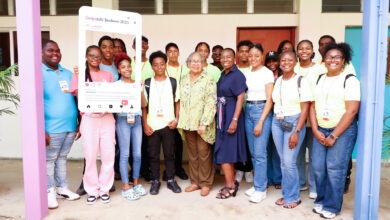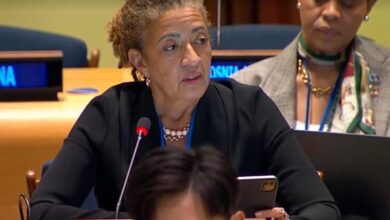(CARICOM Secretariat, Turkeyen, Greater Georgetown, Guyana) I have the pleasure to welcome you to the Twenty-Third Meeting of the Council for Human and Social Development (COHSOD) which will focus on Children and Youth, the building blocks of our Caribbean society. I offer a very special welcome to the Ministers who are attending their first COHSOD Meeting.
It was four years ago, in March 2008, that we convened the Twelfth Special Meeting of the COHSOD to take stock of the kind of Region we were creating for our children. One of the major outcomes of that Meeting was the 20-point Georgetown Declaration on Building a Region Fit for our Children. The Georgetown Declaration committed Member States to ensuring the right of every Caribbean child to survival, development, protection, dignity and participation within the Caribbean Community.
In that Declaration, Member States also committed to improving the quality of, and access to, early childhood care and protection and addressing legislative reforms and protective systems for children and adolescents. The Regional Framework for Action on Children was reviewed and updated targets set for the period up to 2011.
Now, here we are four years later taking stock at this the Twenty-Third COHSOD, guided by a similar theme: Charting our Future: an Integrated Development Agenda for Children and Youth – the most vulnerable, yet the most critical segment of our population.
Within the intervening four years, the CARICOM Secretariat has worked with Member States and Development Partners to give expression to that Declaration. There have been significant gains with regard to regional action to address the development of our children and youth. I will highlight just a few of these.
The development of a regional Framework that facilitates planning and tracking of the Region’s progress in defined areas of Early Childhood Development (ECD), Child and Maternal Health, and Child Rights and Protection, has provided for cohesive and comprehensive collaboration with our Development Partners. This collaboration has resulted, for example, in approved Regional Guidelines for Policy Regulation and minimum standards for ECD services and programmes which have assisted Member States in the regulation and legislation of ECD provisions.
The development of the Standardized Regional Curriculum Framework for Early Childhood Education has made available to Member States a useful resource, as many of them seek to ensure quality of provision of education at this level. This was done in partnership with the University of the West Indies and other Partners.
The Regional Health and Family Life Education (HFLE) Curriculum Framework, which is an increasingly important aspect of education at all levels, had been expanded to include a wider age range – 5 to 16 years.
The submission of the seminal 2010 Report of the CARICOM Commission on Youth Development (CCYD) on the situation of youth in the Caribbean, that led to the Paramaribo Declaration on the Future of Youth in the Caribbean Community, has now been distilled into the CARICOM Youth Development Action Plan and Goals to be presented to this COHSOD.
I thank our Development Partners: the United Nations Children’s Fund (UNICEF), the United Nations Development Programme (UNDP), the Commonwealth Youth Programme (CYP) and others for the supportive role they have played in helping us to achieve some of these milestones.
Mr. Chairman, Ladies and Gentlemen: let me now turn to a problem in our society, which threatens to erode all of the gains which we have fought so hard to achieve. Despite the many plans, declarations, actions and efforts, our children and youth are still falling prey to the social decadence and destructive influences in the Region. Studies have pointed us to the jolting reality of increased violence against children and youth in spaces that ironically were once considered safe havens – their homes, schools and other social institutions.
Sexual violence against children is perhaps one of the most pressing challenges that confront the Caribbean. The World Bank’s Caribbean Youth Development Report (2003) noted that the Caribbean had the earliest age of sexual “debut” in the world. Many young people are being initiated into sexual behaviour as a consequence of child abuse from as early as 10 years old and, in some cases, even earlier.
More recently, the 2009 UNICEF study on child sexual abuse titled Perceptions of, Attitudes to, and Opinions on Child Sexual Abuse in the Eastern Caribbean, not only established that the problem is escalating in this sub-region but also identified emerging forms of abuse, including child prostitution.
According to that Study “an alarming picture of a social problem that is escalating, has increasingly severe consequences for Caribbean societies, has multiple layers and is perpetuated not only by adults who carry out harmful sexual practices with children but also by non-abusing adults through complicity, silence, denial and failure to take appropriate action.” Our own Report of the CCYD is careful to point out that most of our youth are assets and lead productive lives, but it has also painted a disturbing picture of youth in the Caribbean being both the victims and perpetrators of violence. School violence and organized gangs and gang violence have increased drastically and many of our schools have seemingly evolved into battlegrounds and war torn zones. These are the stark realities that provide the backdrop against which the COHSOD meets today.
Ladies and Gentlemen: violence against children is preventable. However, this beast cannot be tamed by simple piece-meal interventions. We owe it to our society to approach the development of our young people as a holistic, continuous process where no one is left out. This is what the life cycle approach is all about.
Very often, for example, the interests and special needs of the 10-14 age cohort – early adolescence – are often not directly addressed in any Ministerial portfolio in some Member States. Better co-ordination in the way we work and the establishment of inter-ministerial bodies for cross-sectoral collaboration on youth development is an imperative if we are to realize the vision of the CARICOM Youth Development Action Plan. This is to create “secure, valued and empowered adolescents and youth realizing their full potential and contributing to a sustainable Caribbean Community.”
An integrated approach – combining strong responsive and preventive measures that emphasize child care and protection, punitive and restorative justice for perpetrators and empowerment and participation of our children and youth – is absolutely necessary.
We must challenge concertedly and decisively the deeply entrenched cultural practices and norms that condone violence and violate the rights of our children and youth. We must expose, through public education, what is frequently considered “a private matter among family,” particularly the vexing issue of incest and child molestation.
The gender dimension of violence against children also must be addressed. Our Gender Advocate, Dr. Rosina Wiltshire has made strong policy recommendations to address gender stereotyping that leads to harmful construction of masculinity that result in too many young men being engaged in violence and populating our prisons. Dr. Wiltshire points to the need for urgent action in the education and social welfare systems, to rebuild the family as the foundation of a healthy society. We look forward to receiving her Report today.
I want to stress that, as a Community, we must invest in evidenced-based policies and sustainable social programmes to address once and for all the social determinants that perpetuate violence against our children and youth. Our regional education goals, for example, must be linked to our social development goals. It is understood that we cannot enjoy economic development without social development. Our education system – while not a panacea for all social ills – must be one of the main drivers of social transformation.
As you deliberate over the next two days, bear in mind that there can be no compromise in charting a brighter future for our children. As we continue to build a Region fit for our children, let us agree that no violence against children and youth can be justified – not those actions cloaked as “tradition” and “culture” and certainly not those disguised as “discipline.”
If we can work together to ensure that laws have the necessary teeth to punish those who exploit our children and youth; if we can work together to build greater community awareness of the risks which children face; if we can work together to ensure that civil society addresses certain “taboos;” if we can work together to ensure that data gathering and monitoring mechanisms are in place to identify children who are at risk; if we continue to work together to ensure that the educational opportunities provided for our youth from the earliest stages remain relevant and prepare them to function in an increasingly knowledge-based environment then, ladies and gentlemen, we would be on the right path in charting a bright future for our children and their children.
I thank you.





